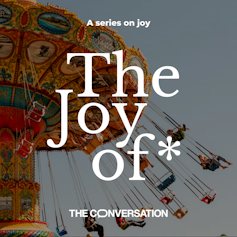
Have you ever felt a sense of joy because you knew you were missing out on an invitation to a party, shiny new opportunities or the latest social media posts and influencer trends because you were “unplugged”? If so, then you have probably experienced “jomo” – the joy of missing out.
Jomo is a rather unusual form of joy because it involves positive feelings due to the absence of an event or experience rather than the presence of a positive event. But that doesn’t make it any less valuable for supporting wellbeing.
In many ways, jomo can be considered the opposite of “fomo” – the fear of missing out. Fomo involves experiencing anxiety and other negative emotions because of a concern that somehow other people are having more fun, living a better life or having better experiences than you are.

This is an article from The Joy Of*, a series to help those of us in our 20s and 30s find moments of happiness in the everyday. When rents are rising, fun with friends is more infrequent and we’re struggling with work-life balance, daily life can seem hard. But joy doesn’t have to be something saved for big occasions, like weddings or birthdays. These articles from Quarter Life are aimed to help you find joy in the smallest things.
Fomo isn’t simply about being obsessed with or addicted to technology and social media. These are simply tools that can feed fomo for some people. Fomo is rooted in our innate tendency to socially compare ourselves to others as we seek to better understand who we are and our place in the world.
Comparing ourselves to people who appear better off than we are on some personal quality, experience or ability, can provide hope and inspiration to drive self-improvement. But for some people, these upward social comparisons can fuel fomo by highlighting what we are lacking and instead prompt negative self-evaluations, which negatively impact wellbeing.
In contrast, when we accept and are satisfied with what we have and who we are, we will be less likely to make unhealthy social comparisons and more likely to experience jomo.
Switching off
Although much of the research to date has focused on fomo and its risks for wellbeing, evidence for the benefits of jomo is starting to accumulate. And some of that evidence has come about accidentally.
On October 4 2021, billions of people worldwide were “unplugged” from their social media channels when Meta experienced a technical failure that resulted in a six-hour outage of Facebook, Instagram and WhatsApp.
Researchers surveyed social media users over the next two days about their emotional experiences and found that not surprisingly, many people were stressed by losing access to their social media. But they also found that for some people, being disconnected came with a sense of relief and even positive feelings, in other words jomo.

Other research on the experiences of people who engage in purposeful disconnection from social media found that jomo includes feelings of taking back control of one’s life. To them disconnecting to experience jomo was a lifestyle choice, much like self-care, or engaging in other healthy habits. People felt they were living more mindfully, being more creative and more productive when disconnected, as one respondent told the researchers:
From a fear of missing out to experiencing the joy of missing out. I don’t have to be everywhere, I don’t have to be with everyone and I don’t have to know everything. Social media can be tricky for my mind sometimes as it wants to compare and convince me that I should be at other places but here and doing something better.
Cultivating jomo
Completely unplugging may not always be necessary to cultivate jomo. Some researchers suggest that adopting more mindful social media consumption habits can help transform fomo to jomo, without abandoning social media altogether. This involves first becoming more aware of your social media habits.
Over time, social media that may have triggered unhealthy social comparisons, perfectionist thinking and fomo is selectively reduced. Social media content is then viewed with increased awareness and less judgement and reactivity, all of which foster jomo.

When we fear that we are missing out on opportunities, we’ll be also more likely to struggle to say no and over-commit our time. But time like any valuable resource, is limited. When people over extend themselves by not saying “no” to invites, opportunities or excessive social media use, the time poverty that results can erode wellbeing.
A pre-requisite for jomo is to learn to value our limited time and how it is spent. In doing so, we create opportunities to experience the joy of being present. We value what we have, rather than worrying about what we may be missing out on.
We can also experience the joy of fulfilling commitments that are valuable to us, which can foster self-esteem and boost our personal confidence. For instance, using your evening to read a book, have a bath, take a language class or cook a good meal instead of saying yes to after work drinks or other social activities or spending time catching up on social media.
Developing a more grateful mindset can also foster jomo. Shifting focus to what you have rather than what you don’t have makes it easier to appreciate the positives in life. This may reduce fomo and increase jomo, because what you are missing isn’t as valuable as what you already have.
Quarter Life is a series about issues affecting those of us in our 20s and 30s.
![]()
Fuschia Sirois does not work for, consult, own shares in or receive funding from any company or organization that would benefit from this article, and has disclosed no relevant affiliations beyond their academic appointment.



